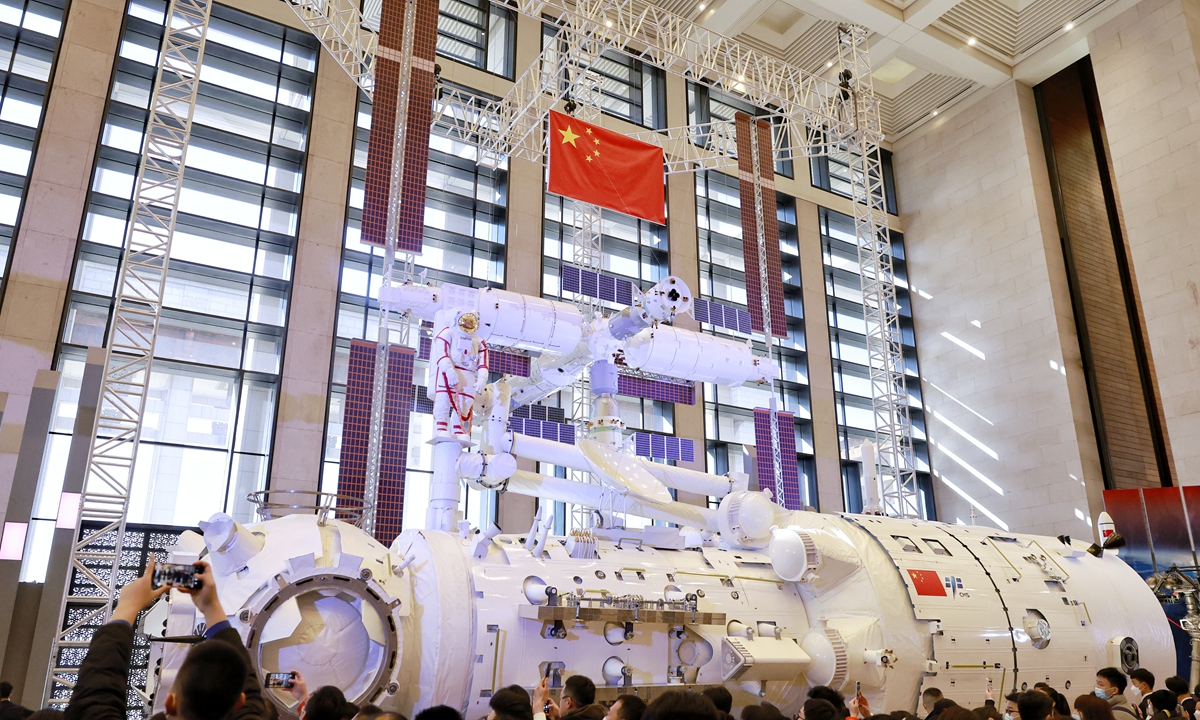China’s manned lunar-landing exploration goes smoothly, selection of international astronauts for Chinese space station under way

Visitors take photos of the 1:1 scale model of the Tianhe core module of China's space station on February 24, 2023. The model is part of an exhibition showcasing the achievements of China's manned space program over the past three decades, which opened the same day and will run for three months. Photos: Li Hao/GT
The selection of the 2023 China aerospace flight crew has come to an end. A total of six taikonauts will take on regular duty at the space station and carry out manned lunar-landing exploration project, said Yang Liwei, a deputy chief designer of China's manned space program.
The selection of the fourth group of China's preparatory taikonauts was started in September 2022. The plan is to select 12 to 14 candidates, and will select payload experts from China's Hong Kong and Macao Special Administrative Regions for the first time.
An exhibition on the achievements of China's manned space program over the past three decades was held at the National Museum of China on Saturday.
"We have completed key technologies such as the next-generation manned carrier rocket, the new-generation manned spacecraft, the lunar lander and the lunar spacesuit for the lunar landing, and formulated a lunar landing implementation plan with Chinese characteristics," said Ji Qiming, an assistant director of China Manned Space Engineering Office.
While the manned mission to the moon will be fully implemented this year, a series of preliminary studies are to be carried out on the long-term survival of astronauts on the moon and the development and utilization of lunar resources, laying a technical foundation for the Chinese to explore the moon in the future, Ji added.
China's space station has entered its operational phase after the successful launch of the Shenzhou-15 manned spacecraft on November 29, 2022, when it docked with the core module.
Three Chinese taikonauts - Fei Junlong, Deng Qingming and Zhang Lu - were deployed to the station, and are due to stay in space for six months before returning in May. The main objectives of the mission include verifying the space station's ability to support crew rotation and achieving the first in-orbit crew shift with the Shenzhou-14 members.
The work division among Chinese taikonauts is becoming more and more concrete, and the selection of sources, types and criteria will also adapt to different missions, Yang said.
"Now China's taikonauts come not only from pilots, but also from universities, as well as from scientific research institutions and engineering departments," he added.
In addition, a cohort of international taikonauts will also be launched at an early date with the preliminary selection phase currently underway. In addressing international cooperation as it related to the space station, a spokesperson for the China Manned Space Agency said a number of space science application projects China jointly coordinated with the UN Office for Outer Space Affairs and the European Space Agency are being implemented as planned, and the relevant payloads will begin to enter the Chinese space station this year.
There will be instructors to provide guidance to international astronauts, including becoming familiar with the use of Chinese spacecraft, said Chen Shanguang, another deputy chief designer of China's manned space program, adding that he hopes foreign astronauts coming to China's space station can learn more about Chinese culture and contribute to exchanges between different countries.
"We have always welcomed astronauts from other countries to enter the China Space Station to conduct experiments. We have received requests from several countries to send astronauts to participate in our space station missions, and we are coordinating with relevant parties and actively preparing for the training of foreign astronauts," the spokesperson remarked.
Global Times

